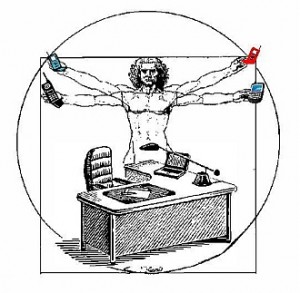 We’ve all heard about the importance of multi-tasking, particularly in the modern technology driven world that many of us now live in. There’s even a big fuss going on now about how the new iPhone update will have multi-tasking capabilities – which is remarkably not that big a deal, really.
We’ve all heard about the importance of multi-tasking, particularly in the modern technology driven world that many of us now live in. There’s even a big fuss going on now about how the new iPhone update will have multi-tasking capabilities – which is remarkably not that big a deal, really.
In our daily existence as sentient beings, multi-tasking really does set us apart from many other species; and is also a large factor for success when competing with other people in our information rich world.
But I would suggest that we haven’t seen anything yet. Think you’re pretty good at multi-tasking? Well, get ready for the Super-Taskers and their uncanny ability to have more things going on at once then you could ever possible handle; even on a good day.
This idea came to mind when watching my younger brother (16) and his friends just hanging out on a lazy weekend afternoon. For most of us, the extent of our multi-tasking on such a day consists of holding a drink in one hand whilst we change channels on the TV with the other – maybe every now and then mixing this up with a few words of conversation if someone else is in the room. Of course, this would be us on a lazy Sunday; why would we exert ourselves too much, that’s what work is for right? This is when I head over to see what the gang are up to: and predictably enough there they are playing a co-op game on Xbox 360. Sounds normal enough; but wait, there’s more.
Each of them had on a 360 headset as they were playing a team game and not only needed to communicate with each other, but also with team mates not physically present. In front of all three of them was an open laptop (two Macs and a PC), and on those laptops each of them had Facebook open, each of them had YouTube running and buffering different funny videos to show one another, two of them also had Skype going whilst the other was playing World of Warcraft. When I came in the room and asked my brother how they were going, I got a detailed response – adding another component to the matrix of attention-demanding focus points in the room. Consider this scene for a moment. Visualise it.
Now ask yourself – when was the last time you did such a thing? For the majority of you, the answer is going to be ‘never’. For many of you even, the answer will be ‘why would I?’, and herein lies the question at hand. In 5 – 10 years do you think you will be able to compete against a hard-wired ability to multi-task (Super-Task…) to this degree? Because that is when the social media generation will be entering the job market in droves, all of them capable of juggling more plates then you can fit in your dishwasher.
But of course, I hear many of you say, we can learn to do such things. In fact, many of us now do exactly that – particularly so with the types of people who would be reading a blog such as Future Conscience. In response, I would ask you to think about how you compare to most of your friends in this regard; and if you’re anything like me you will see that you are already on the top-end of multi-tasking capability when it comes to your respective peer groups. It might sound like a rather hollow prediction, but I’m absolutely sure that society’s capability to multi-task will increase quite dramatically over the next decade or so. The question is, are we able to keep up?
You see, for teenagers such as my brother there is nothing but multi-tasking. These are people who can barely remember a time without Facebook, let alone mobile phones. Webcams, headsets and instant messaging are as normal as opening your mouth to speak to someone in the room with you – and quite often the conversation crosses all four mediums within a single interaction. The amazing thing is that none of the tasks seem to suffer as a result.
Take the game being played in the example given here: they all knew the exact moments they could momentarily distract themselves from the TV screen to type multiple messages in two or three different chat windows, or press play on a newly buffered YouTube video. Regardless of the physical dexterity needed to do this, consider the mental ninjutsu required to follow all of these disparate strands of information simultaneously.
All of us are capable of such things – the human brain is truly a miraculous thing – but it is only the younger generations who have been doing this for as long as they can remember. For them, it is an inherent ability that comes as naturally as walking and I believe that this process will only accelerate as time moves on. Within a decade there will literally be people who cannot remember a life before Super-Tasking. Who have been hard-wired to exist in such a world, and to whom such interactions are as common as Facebook status updates.
Personally, I’m looking forward to seeing the effect this will have on society. It’s possible that such division of focus leads to short attention spans, or less of an ability to focus solely on one unique thing. However, I think it is more likely that our brains are adapting at an incredibly fast rate to the exponential influx of new information sources now available to us. With all of these new information streams to learn from and adapt to, the ability to multi-task is truly one of the most important skills to master; and those who can master it to the point of becoming a Super-Tasker will excel beyond what many can currently fathom.
There are those who are quite negative about this new rush of information. They hate Facebook and think it is anti-social; belie Twitter for its inanity; mock videogame players for their lack of ‘real’ activities. But the shift is coming, and I really don’t think it’s just going to be another fad. Ignore it all you want, but unfortunately such action doesn’t make things disappear – it just means that you are no longer relevant to the conversation at hand. With that in mind, do you think you’ll be able to compete with the Super-Taskers?




